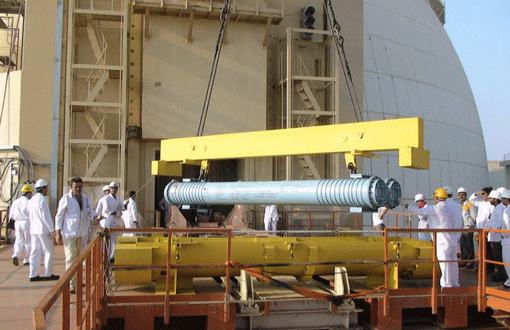The nations of the world have expressed their concern about the Iranian regime’s apparent drive to develop nuclear weapons. Iran, a purveyor of international terrorism and an avowed enemy of Israel, is the target of an international sanctions regime designed to hinder its nuclear program.
Going back to 1987, the United States issued an executive order establishing an embargo on the import of Iranian-origin goods and services. In 1995, in response to Iran’s backing of international terrorism, President Bill Clinton issued executive orders prohibiting U.S. firms from involvement with Iran’s petroleum industry and further tightening trade sanctions on the Islamic State.

The Comprehensive Iran Sanctions, Accountability, and Divestment Act of 2010 prohibited the importation into the U.S. of certain foodstuffs and carpets from Iran. The Iran sanctions programs are administered on the federal level by the U.S. Treasury’s Office of Foreign Assets Control (OFAC).
Although Iran is in talks now with the P5+1 group, international oil and banking sanctions are still in place. The OFAC maintains a “Foreign Sanctions Evaders” list, which names those skirting sanctions imposed on Iran and Syria.
However, a number of press outlets reported last year that the Switzerland-based commodities trading and mining firm Glencore Xstrata may have provided alumina — a material used to start the smelting of aluminum metal — to Iran’s nuclear program.
“Documents filed with the U.S. Securities and Exchange Commission by Century Aluminum Co., in which Glencore owns 41.8 per cent, show non-U.S. affiliates of Glencore entered into sales contracts for agricultural products as well as purchase contracts for metals with Iranian entities, last quarter,” Bloomberg News reported last August.
Both Glencore Xstrata and Trafigura were mentioned as violators of sanctions against Iran, by a confidential United Nations Panel of Experts report, which Reuters described in May 2013.
In March 2013, Reuters reported that Glencore “had supplied thousands of tons of alumina to an Iranian firm that has provided aluminum to Iran’s nuclear program, an allegation Glencore confirmed as accurate. Afterward, Trafigura acknowledged it had also traded with the same Iranian firm.”
The May report by Reuters noted: “Swiss authorities said at the time that they saw no evidence of U.N. or Swiss sanctions violations by Glencore, but the U.N. experts, who monitor compliance with the Iran sanctions regime, raised the possibility that the swap deals were a means of flouting restrictions on trade with Iran.
“‘If confirmed, such transactions may reflect an avenue for procurement of a raw material in a manner that circumvents sanctions,’ the 49-page [U.N.] report said in reference to the media reports on the swap deals. ‘The companies involved have stated that they have halted those transactions.’”
For its part, Glencore responded to press reports about “historical profiteering through trading with Iran,” with the following statement on the corporation’s Web site: “Glencore complies with applicable laws and regulations, including applicable sanctions. We are closely monitoring all new legal developments to ensure that we continue to be in compliance with applicable sanctions.”
While these news reports are of interest, as the U.S., the U.N. and the European Community engage in negotiations with Iran to stop the regime’s nuclear weapons program, Minnesotans should also take special notice: Glencore Xstrata holds a large stake in PolyMet Mining Corp., which is proposing to mine for copper-nickel and precious metals in the Arrowhead region of the state.
The environmental review of PolyMet’s proposed NorthMet mine near Babbitt, Minn., has generated controversy, pitting environmentalists concerned about surface and groundwater pollution from mine waste spillage against mining proponents who contend that sulfide mining will bring jobs and an economic boom to their depressed communities.
So far, the arguments over copper-nickel mining have not concerned the proliferation of nuclear weapons in the Middle East; but the involvement of Glencore Xstrata could change that.
Glencore, which merged with Xstrata last year, holds a 29 percent interest in PolyMet. Aaron Klemz, communications director for Friends of the Boundary Waters Wilderness, told me recently that Glencore Xstrata could take a 36 percent share of PolyMet, if its loans to the company were “converted into equity in the company,” i.e., stock.
And the Swiss-based multinational would be insulated from financial liability for pollution cleanup from the NorthMet project, because “they’re not a majority owner of the company, they’re just a large investor.”
Further, Glencore Xstrata has an agreement to buy all of the NorthMet products for five years after the mine opens (if it opens). “That way they’re preserving their access to minerals from PolyMet, while not having to do the actual work of owning the company or taking on the liability that would be associated with it,” said Klemz.
Has any State of Minnesota agency looked into the Glencore-Iran-PolyMet connection?
In this regard, it should be mentioned that the New York State Department of Financial Services (DFS) has issued subpoenas to four U.S. insurance companies (Chubb Corp., CNA, Liberty Mutual Group and Navigators Group, Inc.) that reportedly “had issued marine-cargo policies for commodities firm Glencore Xstrata PLC allegedly tied to the Iran metals trade,” according to an April report in the Wall Street Journal.
“We are in the process of complying with the subpoena,” a Chubb spokesman told the Journal. “Our policies contain trade sanction exclusions that bar coverage for prohibited exposures under applicable sanctions laws.”
The New York investigation is looking at reinsurers’ compliance with the Iran Freedom and Counter-Proliferation Act of 2012 (IFCPA). Bloomberg reported that the New York department, led by Superintendent Benjamin Lawsky, “subpoenaed European carriers over the matter last year after learning that some firms issued coverage of trades made with Iran. At the time, DFS asked the companies for copies of compliance policies and to identify any instance in which they invoked a sanctions clause to refuse payment of a claim.”
The Jewish World has calls in to U.S. Treasury and New York DFS officials. We will update this story as new information emerges.
— Mordecai Specktor / editor@ajwnews.com
(American Jewish World, 6.20.14)


















